The Library Servicesof José María Azcona (1882-1951), a heritage collection from Navarre
ROBERTO SAN MARTÍN CASI
Library ServicesFROM NAVARRA
rsanmarc@navarra.es
Since May 2015, the Library Servicesof the scholar and bibliophile from Tafalla José María Azcona, one of the main private collections in Navarre from the first half of the 20th century, has been temporarily deposited by means of a agreementat Library Servicesof Navarre. It is a bibliographic collection of 8,419 works in 11,429 volumes that includes important thematic groups, including the collection specialising in the political history of Spain in the 19th century, books on heraldry and genealogy, as well as a BArchive and contemporary works related to the ancient kingdom of Navarre, Vasconia and Bearne, without forgetting his interest in the bibliographyof Navarre. Regardless of the presence of some very rare bibliographic items or artistic bindings, its true cultural and therefore heritage value comes from the collection as a whole. Not only because it brings together thematically unitary bibliographic collections, but also because it is a reflection of the life and intellectual career of a Navarrese figure who had a certain relevance in our community. For this reason, in 2005 the Government of Navarre declared it an Asset of Cultural Interest with the aim of protecting it and putting it to use as sourceof enquiryfor programs of studyhistorical sites of various kinds.
José María Azcona y Díaz de Rada
To talk about this Library Servicesis to talk about its creator and vice versa, it would be unthinkable to make a biographical note of José María Azcona without going into the trainingof his Library Services, perhaps the main activity he carried out throughout his life.
José María Azcona (1882-1951) was a multifaceted character: politician, businessman, bibliographer and bibliophile, traveller, scholar and publicist, versed in 19th century liberalism and Carlism, accomplished heraldist and genealogist, member of important cultural entities.
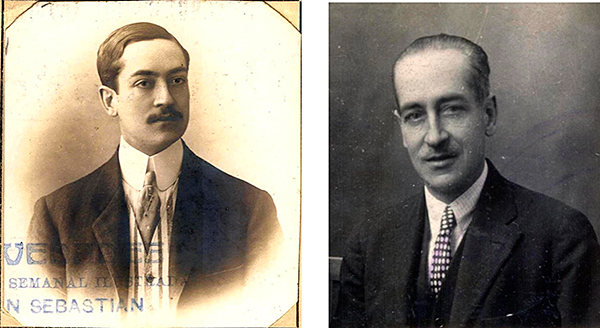
He was born on 17 November 1882 in Tafalla, into a family of the upper middle class of Navarre, whose economic and social position was quite high. His name honours his great-grandfather on his mother's side, José María Recart de Landívar, owner of the manor house of Tafalla, representative in the Cortes of Navarre in 1817-18, 1828-29 and deputy of the Kingdom (1834). He received a careful Education. Between 1899 and 1905 he studied Law and Philosophyand Letters at Deusto; in 1902 he obtained the licentiate degreein Letters from the University of Salamanca and in 1905 he was already a lawyer. Years later he obtained the doctoratein History from the Central University of Madrid. From a young age he maintained and developed a formidable humanistic background, combining an intense social life with his involvement in the political life of Navarre and his early interest in literature. Close to conservative liberalism, between 1914 and 1916 he was a member of parliament for the district of Tafalla.
His departure from active politics coincided with the beginnings of his passion for bibliophilia. Although he never abandoned his interest in politics, this took a back seat to his historical and bibliographical interests. The Library Servicesis a good reflection of his personality and intellectual activity, typical of a bourgeois patrician, cultivated and idle. It was the axis through which his intellectual and ideological concerns circulated, where he gathered erudition and knowledge that he used for his research. Many of his personal relationships, whether with booksellers, bibliophile friends, intellectuals, politicians, Basque-Navarrese cultural figures, fellow countrymen, etc., passed through it.
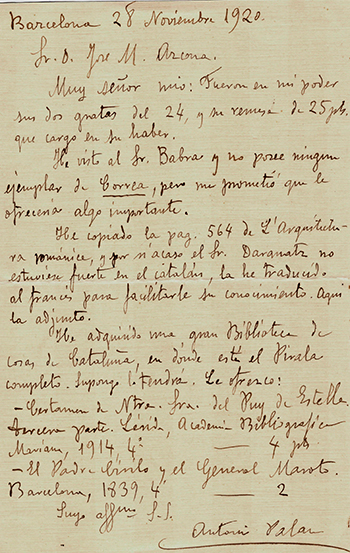
trainingof the Library Services
Before devoting himself intensely to bibliophilia, Azcona already had an important family collection, Library Services, which came from the Díaz de Rada and Recart de Landívar families. From 1916 onwards, his main activity revolved around adding to the collection. Time and money, two conditions of high bibliophilia that Azcona more than fulfilled, as well as another common characteristic, the continuous eagerness to locate or obtain this or that book or pamphlet that he was reluctant to get hold of. In the 1920s, he devoted himself tenaciously to searching for, locating, acquiring, exchanging and binding his acquisitions. He maintained a fluid correspondence and commercial relationship with the best Spanish antiquarian booksellers of the time - the Vindel family, García Rico, Ontañón, Palau, Babra - as well as foreign ones - Picard, Klincksieck, Privat, Maggs Bros., Solomons R. Berkelow, Rosenthal. Not forgetting the closer and more modest bookshops of San Sebastián and Pamplona and especially those of Bayonne, Pau, Biarritz, Saint-Jean-de-Luz, Toulouse and Bordeaux, places where Azcona was a regular visitor.
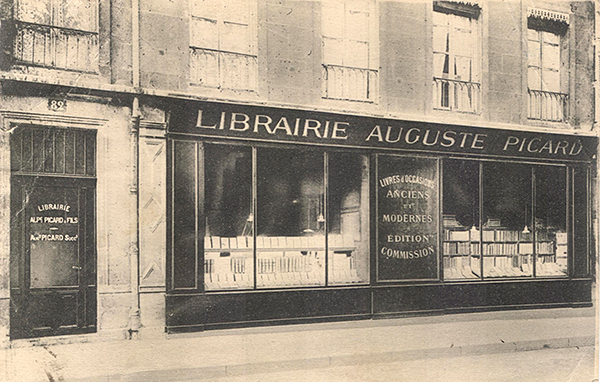
He frequently made "bibliographical excursions" around Navarre and other places in search of old papers and books belonging to private individuals that were easy to obtain thanks to his influence partner-economic and client networks. He was delimiting the subjects of interest and for this purpose he published several Desideratas with references to titles and editions to be obtained.
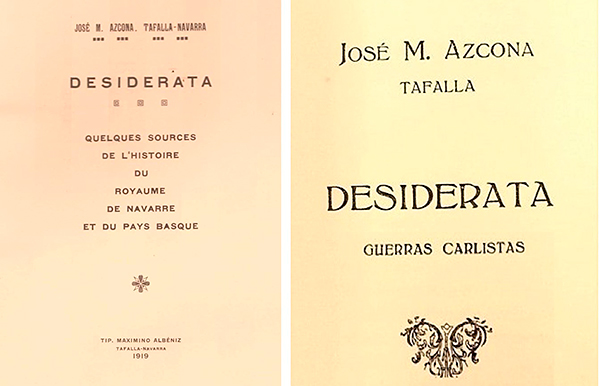
The collection
accredited specializationAs mentioned above, there is a considerable issueof works referring to the political and civil struggles of the 19th century, with special emphasis on pamphlets, ephemeral material, periodical publications, some manuscripts and foreign editions. There is also a collection of the noble titles of surnames of Navarrese origin and the Bcollection related to the old Kingdom, with special emphasis on historiography of French origin. Although the Archiveis considerable, a very high percentage of it is a contemporary Library Services, typical of a cultivated man of his time. Modern editions with splendid bindings, classic and contemporary authors predominate, where the above-mentioned subjects predominate, but literature, art books, travel books and, surprisingly enough, a small groupof titles related to witchcraft and esotericism also stand out. Another very significant value of the collection is the 19th century and contemporary periodicals collection it contains.
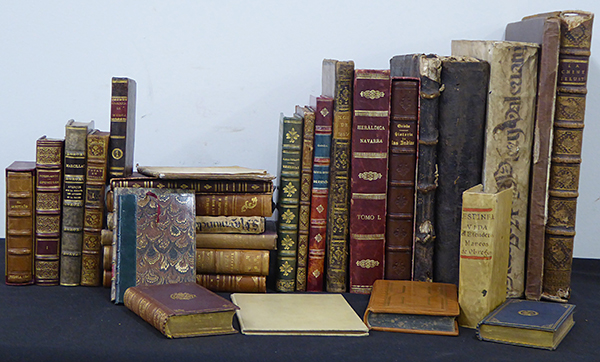
As an elite bibliophile, Azcona attached great importance to artistic bindings and, unlike other collectors, he also showed an inclination towards learning this craft, an activity he practised with skillduring the last decades of his life. Another characteristic feature of any self-respecting bibliophile, which Azcona shares, is the existence of an ex-libris or identifying property mark.
The Desideratas and his eagerness bore fruit and in the 1930s Azcona had practically formed his collection. During these years Azcona was already a nationally recognised bibliophile, and his BLibrary Services brought him social and cultural prestige. Palau points out in his Memoirs that in the first decades of the 20th century, a new customer subjectemerged, whom he describes as a neo-bibliophile, increasingly more cultured and bibliographically prepared and therefore more demanding, at the same time as the symbolic value of social prestige that private collections attained among the elite was re-emerging. Azcona corresponds to this new client described by the bookseller. In a way, as a bibliophile, he "rivalled" other Navarrese personalities who had magnificent libraries: Arturo Campión, Joaquín Beunza, Julio Altadill, José María Huarte, Joaquín Argamasilla de la Cerda, the Count of Rodezno, Manuel Gastón, Manuel Irujo and Baroja in Bera.
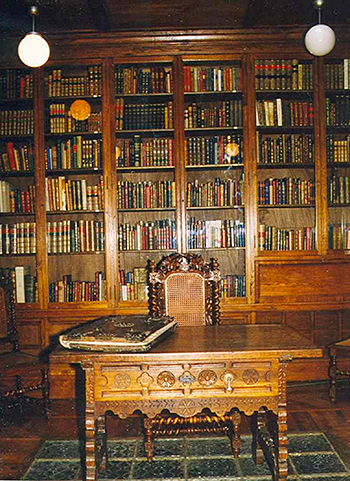
Azcona scholar and publicist
It was Azcona himself who soon publicised his Library Services, his articles and publications are displays of bibliographic knowledge related to readings and expertise in the handling of repertoires and catalogues. His status as a bibliophile and scholar, together with his privileged social position, opened the doors of important cultural institutions to him. He was a delegate (1918) and then board member of the Commission of Historical and Artistic Monuments of Navarre; an early member of the Society of programs of studyVascos-Eusko Ikazkuntza; in 1921 he joined the Société des Sciences, Lettres et Arts de Pau and in 1923 he was appointed a corresponding member of the Royal Academy of History.
He took part with books and engravings from his collection in the "exhibitionde Arte Retrospectivo" organised by the Commission of Monuments of Navarre as part of the activities of the 2nd congressof programs of studyVascos de la Sociedad de programs of studyVascos (Pamplona, 1920). In 1927 he was an active member of the organising committee of the "exhibitionon the Civil Wars in the Basque Country and Navarre in the 19th century" which was to be held in Pamplona the following year, but which was finally frustrated. She provided the organisation with more than 3,000 bibliographical references on the subject. He also collaborated in the exhibitionof Basque Books organised in 1935 in Vitoria by the Alava-based group"Baraibar" of Eusko Ikaskuntza.
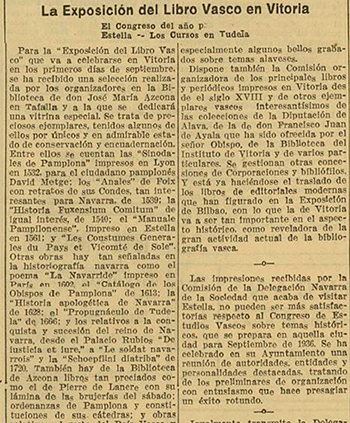
Although a tireless worker with literary gifts, he published only a couple of books and a few articles in magazines and newspapers. He signed some historical articles in the bulletin of the Commission of Monuments of Navarre, with an extensive workon Navarrese heraldry still pending. In his newspaper articles in El Pueblo Navarro and El Pueblo Vasco of San Sebastián he sometimes uses the pseudonym "Fray Gerundio de Tafalla". Other newspapers and weeklies in which he contributed include La Voz de Navarra, La Voz de la Merindad and the magazine Lecároz.
In 1932 he moved with the whole family to Madrid, although he spent his holidays in Tafalla, San Sebastián and Pau. In the Villa y Corte he spent his time looking for books and other Materials - pamphlets, engravings, periodicals - that he could not find. He is also busy learning the art of bookbinding under the guidance of the young master Antolín Palomino. He frequented various literary and political gatherings, such as those held in the cafés "La Elipa" and "El Gato Negro", as well as those organised at bookshopde García Rico and Tormos. His interlocutors were a mixture of ideologies, united by their passion for history, literature and especially bibliography; prominent figures such as Azorín, Gregorio Marañón, Baroja, Max Aub, Vicente Castañeda, Rodríguez Marín, Roque Pidal, Francisco Vindel.
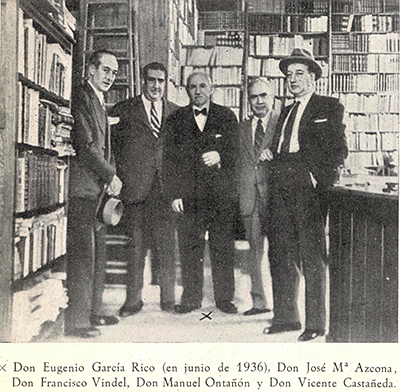
During these years he intensified his research work, focussing on the study of figures from the first half of the 19th century. In 1935 he published what was to be his first monographic work, Clara-Rosa, masón y vizcaíno (Clara-Rosa, Mason and Biscayan). The work is a biography of Juan Antonio Olabarrieta, a former Franciscan friar and exalted liberal, freemason, publicist and revolutionary in Cadiz during the Constitutional Triennium, who became known under the pseudonym of "José Joaquín de Clara-Rosa" and died imprisoned in 1822. Through this character Azcona portrays in an entertaining way the revolutionary atmosphere of that period, while at the same time being a diatribe against it. It reads with the interest of a novel, full of psychological portraits, exemplary anecdotes and refined irony. It is also a boast of bibliography, with continuous quotations from books, pamphlets and periodicals of the period, many of them from his extensive Library Services.
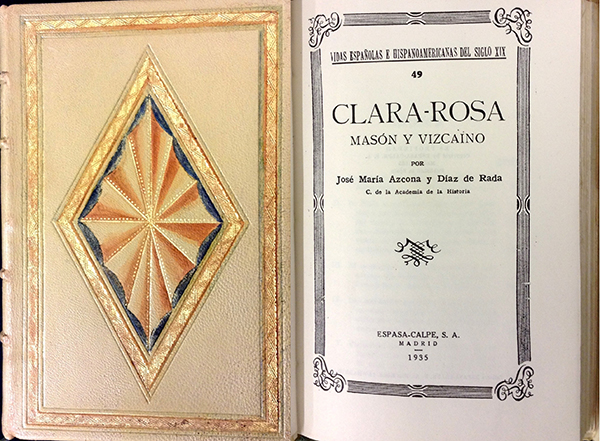
Otium cum dignitate
When the Civil War ended, Azcona retired to his manor house in Tafalla, from which he rarely left. He devoted his time to reading, bookbinding, polishing unfinished works and publishing articles on guerrilla fighters who fought against the French, royalists against the liberals, liberals against the Carlists, or foreigners in the Carlist ranks. He always emphasised individuality and specific events to the detriment of the whole. Although to a lesser extent, he also spent time acquiring books or subscribing to new publications. As a literary publisher, annotator and commentator, in 1942 he published the memoirs of Prince Félix Lichnowsky (1814-1848) under degree scrollRecuerdos de la guerra carlista (1837-1839).
Thanks to the background of his Library Services, at this stage Azcona is focused on finalising his most elaborate bibliographical work: Zumalacárregui: estudio crítico de las fuentes históricas de su tiempo (Zumalacárregui: a critical study of the historical sources of his time). Although it is an exhaustive bibliographical repertoire and as such an instrumental book, it is not limited to containing an arid list of references but is full of short biographies, observations, anecdotes, comments on events and analyses of some historical documents. Accompanying the text is a collection of intercalated plates, some of them coloured, reproduced from albums and books of the period, which gives the work a romantic air very much in keeping with the character and Azcona's tastes. It is a posthumous book, published shortly after his death, on 1 June 1951.
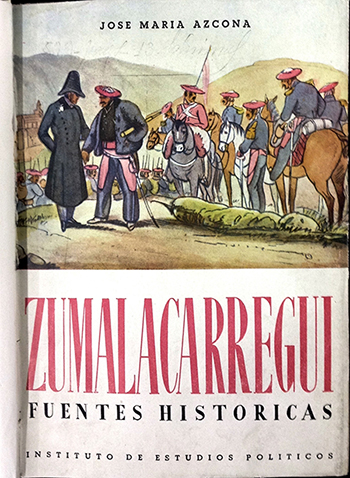
In the 1940s Azcona intensified his interest in bookbinding, encouraged by the purchase of a collection of Spanish-style irons and wheels from the workshop of Miguel Ginesta, one of the most prestigious Spanish bookbinders of the 19th century. On the other hand, he always maintained a certain vocation as a librarian. From the beginning, when he was building up his collection, he was generous in sharing his Library Servicesand lending books to friends and acquaintances. In his years of retirement in Tafalla, his notorious and pleasant erudition was preceded by his reputation for being hospitable to all those who visited him in search of information at his Library Services.

Galbete Martinicorena, Vicente. "Esbozo bio-bibliográfico de José María Azcona", in W. von Rahden, Andanzas de un veterano de la Guerra de España (1833-1840), Pamplona, Institución Príncipe de Viana, 1965, pp. VII-LI. A number of offprints were also published.
San Martín Casi, Roberto. "La Library Servicesde D. José María Azcona (1882-1951), erudite and bibliophile from Navarre", in Huarte de San Juan. Geografía e historia, nº 23 (2016), pp. 51-155.˂http://hdl.handle.net/2454/23866˃

